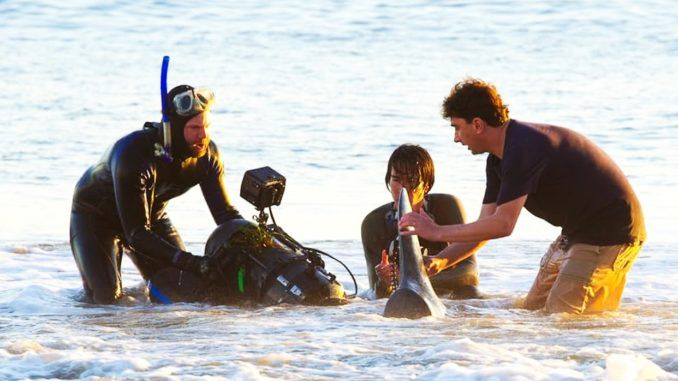
Anthony C. Ferrante is best knows as the man who directed all six episodes of the Sharknado franchise for The Asylum and the SyFy channel. To mark the tenth anniversary of the cult series’s first appearance, it’s getting a spiffy theatrical release, tonight and tomorrow. But Ferrante doesn’t just make films about flying sharks. His filmography has close to thirty other directorial credits, covering everything from Hallmark Christmas movies to unrepentant horror flicks. As he geared up for Sharknado’s appearance on the big screen, we talked to him in depth about the enhancements made for this version, how the franchise opened doors for him, and his favourite shark movies.
Ten years on, Sharknado is getting an enhanced re-release in cinemas. What’s all that about?
We knew ten years was coming up, and one of the things we started asking was, “Could we just colour correct the movie?” That was the original thought, and then it was like, “Well, what if we put back in some of the things that were in the first cut I delivered?” – things that we couldn’t do because we didn’t have enough visual effects or enough time to make that stuff look good. Then it became, “Let’s remaster it in 4K!”, and suddenly, “Let’s go theatrical!” This little idea kinda spiralled out of control. Ten years ago, for television, we didn’t have to deliver 4K, so the images weren’t that great. Once you start upscaling, suddenly some of the visual effects don’t hold up, because the plates aren’t 4K. So they had to do 4K plates for certain shots, and the old visual effects laid on top of a new plate.
We realized the television version is always going to be there, and that’s always going to be the original. But if we’re going to go theatrical, we want to give a theatrical experience. You get your clarity, better colour correction, more effects, a little more vision of what we originally wanted to do, and then we remixed the entire sound. I just watched it last night and it’s amazing. I think there’s going to be this weird Mandela Effect with Sharknado: “Was that always there, or was it not always there?” There are these weird, slight deviations of things.
It’s the same ridiculous, outrageous film as before. It’s just full of more sharks.
When we did the original movie, because we had so little time, we had this edit that had to be made because visual effects came in short. We didn’t have time to redo a shot, so there were things around those shots that had to be adjusted. There are things that bothered me for ten years, where people aren’t reacting to something, because the visual effect came in short, so the reaction is delayed. I was able to clean up the gaps, make very imperceptible edits, just to make it more of a “Special Edition Director’s Cut”.
It was really fun going back into the film. We didn’t want to go out and shoot new things, we wanted it to stay true to what we originally intended. One of the shots I wanted was to have the Capitol Records spire impaled by a shark. I actually went out and shot a plate ten years ago for it, and we had no time to incorporate it. Now, I finally got to realize that shot. It’s the same ridiculous, outrageous film as before. It’s just full of more sharks.
It was an interesting process. We kept the original cuts that we submitted to the network. I didn’t want to watch the movie, I wanted to watch my first and second cuts of the film – the first cut I assembled, and then the cut I submitted to the producers. As I went through, I’m going, “Oh, yeah! I forgot, on the ship, he’s supposed to fall into the water and get sucked up into the tornado. But that got truncated: we should bring that back.”
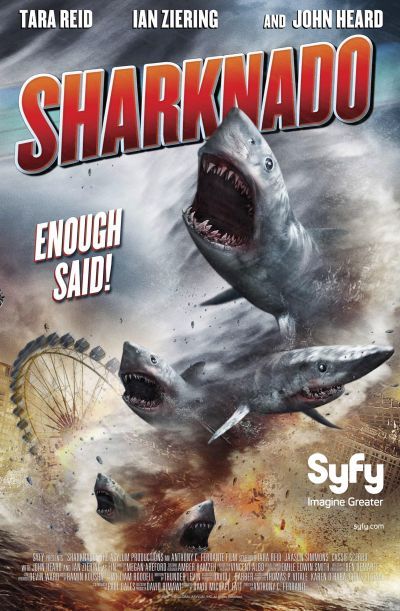 Or the whole parking-lot scene where Fin is running to the old folk’s home with his family. He shoots a shark, and if you look in the shot, the other people in the shot are doing things – but they didn’t put the sharks in. Knowing they were going to extend certain moments, I went and recut that entire scene. The swimming-pool scene, we didn’t have time to have sharks, so we used stock shots. Now, we are able to have the sharks fall in the pool. There was an actor where we cut a scene, and we never did his death, so I rejiggered his death to be in the film. There was a lot of really cool stuff that we were able to add to the film. It adds more gusto to what was already there. If you watch the movie, there are a lot of shots where some of the sharks just don’t look great. They’re “take ones” of the visual effects that had to go in there. So we’re going to fix those shots.
Or the whole parking-lot scene where Fin is running to the old folk’s home with his family. He shoots a shark, and if you look in the shot, the other people in the shot are doing things – but they didn’t put the sharks in. Knowing they were going to extend certain moments, I went and recut that entire scene. The swimming-pool scene, we didn’t have time to have sharks, so we used stock shots. Now, we are able to have the sharks fall in the pool. There was an actor where we cut a scene, and we never did his death, so I rejiggered his death to be in the film. There was a lot of really cool stuff that we were able to add to the film. It adds more gusto to what was already there. If you watch the movie, there are a lot of shots where some of the sharks just don’t look great. They’re “take ones” of the visual effects that had to go in there. So we’re going to fix those shots.
We stayed true to the aesthetics of the original movie. There are people that are aware of Sharknado, there are the fans who love it. There are people that know it as a meme – “Oh, Sharknado, stupid movie” or whatever – but they’ve never seen it. Now they’re actually going to experience the film, and hopefully go, “Wow, I get it.” It’s completely different from what people think it is. Go to the theatre, watch the theatrical, and try to enjoy it as a new experience. Then go back and watch the original. to get an idea of what we changed.
What do you remember most about the experience of shooting the first film?
Y’know, I forget about these things a lot. As a film-maker, at a certain point you’re making the movie, then you’re editing the movie, and the movie becomes the movie. You forget, “That shot was done on day 14” or “We did that in the pick-up” Because I watch it more than anybody, probably, it all just starts bleeding together. But by going back into the edit, I got to go through it day-by-day and watch all the footage, to see if there was anything else that we were missing.
Oh, another thing we found was John Heard cursing in a shot, and because it’s theatrical, we were able to include it. I was listening to the tape and it was really funny, but “It’s TV, John – you can’t say that.” Then he did theclean version, and he tanked the line, because he knew it was shit. I was able to put his actual ad-libbed line in there, so you now have the first profanity in a Sharknado movie!
But going back to your question, going through the dailies reminded me of what the experience was like, making the film. I did a lot of horror films, and this was a movie where I had toys I’d never had before, like cranes, water. build a set in a swimming pool. We were doing crazy shit for a movie that had no budget. It was ambitious: I really wanted it to be ambitious. I figured if I was doing a movie called Sharknado, I wanted to put everything into it. There were a lot of limitations and shortcomings and chewing-gum. I was trying to make a studio movie, on a beer budget. And in this case, it was probably Blatz Beer.
There’s an innocence to what we were doing because it wasn’t what it was. But I’m impressed with the fact that they let me make this movie. It doesn’t fit into any template. It’s weird, at times strange – incredibly bloody for a SyFy movie at the time. We do a lot of practical deaths in the film, the guy that gets his arm bitten off, for example. There is just some crazy shit that we pulled off in this movie that I’m grateful for.
But it was also the relationships that were created. Ian Ziering, Tara Reid, Cassie Scerbo, Jaason Simmons, Chuck Hittinger, Aubrey Peeples, and John Heard. John was the guy that kinda knew something would happen with the movie. He said something weird to me, the last day on set, to the effect that “there’s a method to your madness on this thing – there’s something here.” John Heard has been in Home Alone and Cutter’s Way: if anybody would know if there was something going on, it would be him. I was just trying to make the most fun, crazy movie with the budget I had.
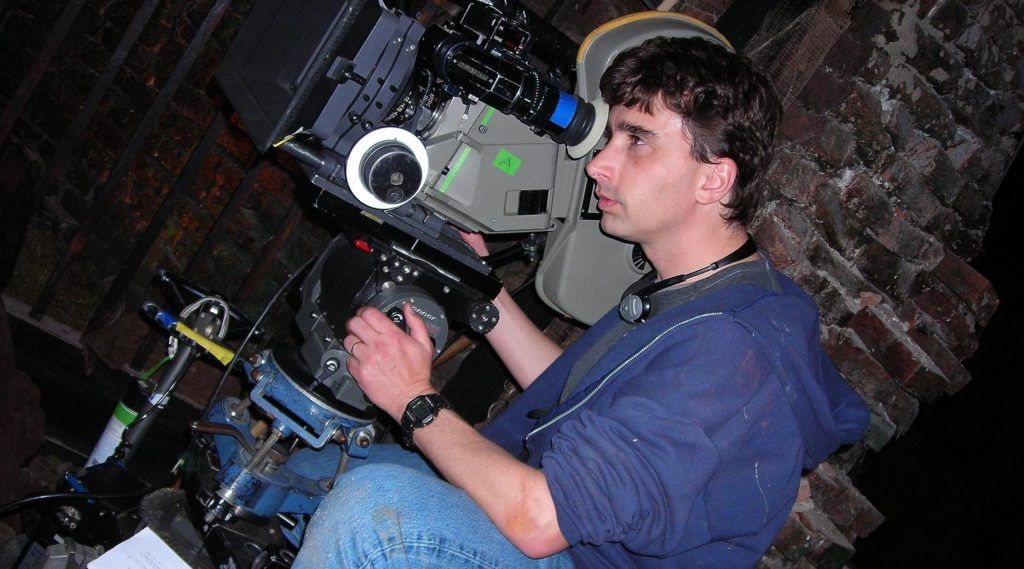
When did you realize it had hit that pop culture nerve?
I think it was a couple of days before, we sensed something. An editor friend of mine called me and said people in 7-11 were talking about Sharknado. I was like, “You’re high.” I’ve had movies air on SyFy before. You get the SyFy audience. There’s nobody in Van Nuys talking about this movie. And I was wrong. That night, it was Twitter. It started spiralling, it just wouldn’t stop. With my background in journalism, I knew something had happened. I wasn’t quite sure what happened, because it seemed very weird, and it’s not supposed to happen for a film like this.
Then I was driving to see a second screening of it with my crew – I watched the first one with my family – and I get a call from Buzzfeed. Then while I was watching the screening, I got a call that CNN wanted to talk to me. The next day, I literally got in my car and travelled to every single news show, because the actors weren’t available. It was Asylum, Thunder Levin the writer and myself who were doing all these interviews. We broke Twitter, and did something that doesn’t happen for a TV movie. It was a big deal, it was like a theatrical film, and everybody was talking about it.
Did you change your approach for the sequels?
Here’s the thing. I know a lot of people look at Sharknado, and they see the limitations on it. We’re not stupid. We know what our limitations are. We didn’t have $200 million. We had less than a million dollars, and eighteen days. But a friend of mine said, “It’s a movie that doesn’t know it can’t do that.” We went in and achieved what we could achieve, with what we had. But the first film, I couldn’t shoot the sky, or things in LA, because it would require more visual effects. So there’s a lot of weird things that I hated about the film, about the angles and stuff, because we were hiding things. If we went a little outside of the space that we had, it would need a visual effect, because you didn’t have a storm or rain. It was sunny every frickin’ day.
In the second film, we were in New York, it’s the “polar vortex”, and you could shoot up in the sky. So if you look at what we did in New York, we were actually able to show our world. We were able to shoot in these locations and not have to hide things. The second movie, I look at like Evil Dead and Evil Dead 2. The second movie, they had more money and basically redid the first movie. So we kinda redid the first movie in New York, while still continuing it, but expanding upon things. People kept complaining that sharks can’t exist in tornadoes, and I kept saying in interviews, “Well, it’s sharknado sharks.” When we did the second movie, that became liberating because our villain is a sharknado. It does what we tell it to do. It can take down a plane.
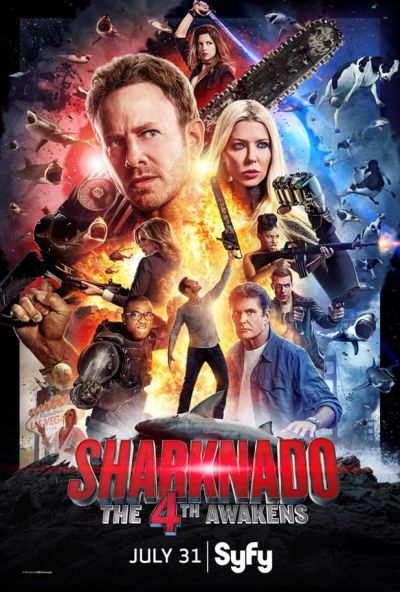 So the toys got bigger – New York was a brand new toy – and as we progressed, each movie we tried to do different things, and play with different genres. For me, as a film-maker, it just kept it fresh. They also allowed us to lean more into the comedy and the ridiculousness. The first movie is very straight, with a lot of gags and jokes. It goes far, but – and this is a weird word – it’s more grounded. As we got into the second movie, when a sharknado is taking down a plane, we fully acknowledge, there’s even a line in the movie, that we have jumped the shark at that point.
So the toys got bigger – New York was a brand new toy – and as we progressed, each movie we tried to do different things, and play with different genres. For me, as a film-maker, it just kept it fresh. They also allowed us to lean more into the comedy and the ridiculousness. The first movie is very straight, with a lot of gags and jokes. It goes far, but – and this is a weird word – it’s more grounded. As we got into the second movie, when a sharknado is taking down a plane, we fully acknowledge, there’s even a line in the movie, that we have jumped the shark at that point.
Each movie, we tried to get better and we tried to shoot in locations that are in the film, to show that we could do it with our low budget. We filmed in Washington in the third movie. We got to film at Universal Orlando because SyFy is owned by NBC. We did things that these movies aren’t supposed to do, and that’s what kept it fresh. The fourth movie was kind of a science-fiction movie; the fifth movie was a travelogue; the sixth movie was time-travel. We never got bored with it.
But also, I got to start and finish a movie franchise, and do it with my two leads, Ian Ziering and Tara Reid. They were there for us from beginning to end. For me, that’s the biggest gift of this. What film-maker gets to make an original film, that’s not based on an existing IP, from start to finish, to be the traffic cop for tone and story, and be able to kill it, when it’s time. It’s rare. There have been a lot of people involved with this. Everybody at The Asylum; the producers of the movies; SyFy; Thunder Levin and Scotty Mullen, who were writers, the development teams. They all worked hard to make these movies what they were, and I think that’s why they became special. Aside from the product placement that we had to do for the film, I don’t think you look at these movies cynically. They’re an anomaly. They’re these ridiculous, outrageous films that somehow captured the world. And they’re still around and we’re still talking about it.
A lot of celebrities cameod in the movies? Which ones stand out from your side?
Oh, it’s like picking children! The second movie, we started leaning heavily into cameos. I think what changed everything is, I was in New York, and we were trying to get someone to play the pilot in the opening scene. That was a homage to the Twilight Zone episode, “Nightmare at 30,000 Feet”. So, obviously, we’re never going to get John Lithgow to play the pilot, but there was talk of, “Hey, maybe we should get William Shatner.”
Now, I always bring movies to watch while I’m doing a film, and I brought the Airplane! movies. I was watching them with my family, and my wife goes, “You should get Robert Hays to play the pilot,” and I went, “That’s a brilliant idea.” I walked outside, called one of the producers on the phone and said, “We need to hire Robert Hays to play the pilot,” and they go, “No, it’ll make this too jokey.” No, we have to hire him. “Well, as long as you don’t make Airplane! jokes.” And my fingers are crossed as I say, “Of course I’m not going to make an Airplane! joke.” So they hired him.
Anybody that loves comedy is obsessed with Airplane! among many other films. It’s just such a brilliant movie, and Hays is so good. There he is on set: I’m getting to work with Robert Hays, and we’re getting to do Airplane! and Sharknado, with him as a pilot. That was one of the most special moments, because it was just the kid in me. To get to play in a sandbox with someone that meant something to me growing up. I loved Monty Python, Saturday Night Live and Airplane! – just weird shit. Now here I am, making a weird movie that became popular, with an actor that I adored.
Everybody was fantastic. Except for one person.
Then we leaned into making those jokes with other cameos as we went along – get them to play things that people know about. Judah Freelander was on Twitter that night it aired, and one of my favourite Tweets was he wrote, “Yes, I’m Anthony C. Ferrante and I directed Sharknado.” So I responded, “Yes, I’m Judah Freelander and I starred in 30 Rock,” and we got him in the second movie. I loved working with Judah because I come up with a lot of ideas on set and I just throw them at the actors. With Judah, you could throw the most random stuff, and his mind is so brilliant, he’ll take it and regurgitate it out in this brilliant way. We brought him back in the sixth movie and I was, “We’ve got to do a Back to the Future reference.” He took it, and in a minute, output something I couldn’t even have come up with.
So, yes, the cameos were great. Fabio as the Pope? C’mon! Olivia Newton-John. As I said, it’s like picking and choosing from your children. Everybody was fantastic. Except for one person. Maybe there’s about five people: some of the reality TV people, who were there because they were forced to, and they didn’t want to be there. There’s one where… yeah, okay, that was not the greatest experience. But I’ll never say who that was!
Would you ever go back and do a part 7?
You know, everybody always asks that. At some point, they’re going to do something. It’s gonna happen. If it’s the right story, and they ask me back – of course. I’m still very attached to Sharknado, and The Asylum has been very, very generous with keeping me involved in pretty much any spin-offs or things that happen. Like we did a bunch of trading-cards, so I read all the copy for it. I’m very protective, because it was six years of my life, and I put a lot of my time and energy into these crazy movies.
So, if we can do it right. I still think there’s a musical that we should do at some point, if that ever happened. I have had ideas, if we had to do a sequel, what would interest me, and it always has to go back down to the character stuff. People forget the reason these movies work is because it wasn’t about the military or scientists, it was about the Shepherd family. The first movie, take away all the sharks, and it’s about a dude who has screwed up his life. He got a big head, he lost his family, because he was stupid and got a big ego. Lost his bar, lost his car, lost his house. But by the end of the movie, he regained his family. In each movie, we continue that theme.
It’s such a simple anchor, and yet to me, I think that’s the secret sauce of the film. You care about these characters and their journey. And then you have the weird stuff! The sixth film has probably two of the most emotional scenes in all of the Sharknado movies. One is Fin talking about not going back and saving everybody, just staying in time with his son, because he’ll never see him again if he resets time – his son will cease to exist. That’s a really heavy thing for Sharknado. The same thing with Cassie’s character, Nova. She has an amazing speech about how her grandfather dies, and she wants to go back and save him. There’s weird things in these movies – we had six to play in, and we got to pay them off by the time it was over. That is where you have to start: what is the connection? And then you add the weird stuff on top of it.
How has the franchise impacted your career overall? Has it been a positive?
Yeah, I was “the horror guy” before Sharknado. SyFy didn’t want me to direct Sharknado. They said, “He’s a horror guy, he doesn’t know how to do this,” before they finally went, “Fine, hire him.” I think it was hard for people not to necessarily know who I was or what I did with it, because you can’t categorize Sharknado. Is it a comedy? Is it action? Is it stupid? What is it? The movie gave me a chance to do some other genres. I’ve done some thrillers, I got to do two Westerns, Butch Cassidy and the Wild Bunch and Butch vs. Sundance, with Bruce Dern. A Christmas movie. A pirate musical.
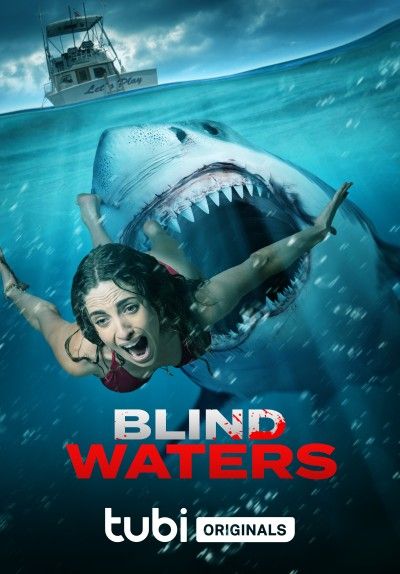 I still do horror. Last year, I did this film, Nix, which I’m really proud of. It’s a totally independent horror film that’s completely serious and dark. This year, I came up with the concept for a shark movie called Blind Waters, about a couple stranded on an overturned boat. The woman hit her head, and she can’t see, so they’re surviving in the water, with a shark – and she’s blind. When I was writing it, I wasn’t going to direct it, but then I started to really like it. I talked to my wife and I talked to other people: “I’ve already done the shark movie, so is it weird me doing this thing?”
I still do horror. Last year, I did this film, Nix, which I’m really proud of. It’s a totally independent horror film that’s completely serious and dark. This year, I came up with the concept for a shark movie called Blind Waters, about a couple stranded on an overturned boat. The woman hit her head, and she can’t see, so they’re surviving in the water, with a shark – and she’s blind. When I was writing it, I wasn’t going to direct it, but then I started to really like it. I talked to my wife and I talked to other people: “I’ve already done the shark movie, so is it weird me doing this thing?”
But I realized I’ve never made a real shark movie. I’ve made six Sharknado movies, and in the six Sharknado movies, there is about ten minutes in the first that is a shark movie. Everything else is just Sharknado. The other thing was, if we do this, I want to do it for real. I want to go out into the open water, I want to get certified to dive, I want to go diving and shoot the footage. We went to Mexico and we did it. My DP and I were out in open water for three weeks with the lead actors, who were doing most of the stunts. We dove 87 feet to a wreck and shot most of the footage underwater, and there’s something that’s tactile and real about it. It was a chance to play around in a different sandbox, and to me, as a film-maker, it’s all about getting to do different things.
That’s why I don’t look at the six Sharknado movies as, “Oh, we kept doing the same thing.” We did different things. So the gift of Sharknado is, yeah, for a little while people were, “Yeah, he just does goofy comedies,” but I’ve now done all these different things. I always thought I’d be the horror guy when I was growing up. I love horror movies and I still do horror movies, don’t get me wrong. But as my career has progressed, I’m liking the fact that I’m more – obviously nowhere in the camp of these guys – but in the zone of what Stephen Soderbergh and Clint Eastwood do. They’ve been allowed to traverse different genres and experiment. If you look at my last four, five, six movies, everything is different, and that’s what keeps it fresh and interesting for me.
I’d love to do a gigantic studio movie, I’d love to do something with a bigger budget. But I’m getting to play in genres that, if I hadn’t done Sharknado, I would never have been given the opportunity to do. That’s been the best thing about it.
Can you talk a little more about Nix, which I know you wrote, produced and directed.
I’d worked with the producers before on a movie called Awaken the Shadowman – I’d produced it with them, worked a little on the script. It was in the middle of COVID, they came to me and said, “We’ve got this project, we’d love for you to direct it.” We were talking about this concept, and I didn’t want to get too far into the weeds on writing it. But as they were going through this concept that they had, we realized there were a few problematic things with it. We could never figure out an ending. I go, “It’s the concept,” and everybody kind of agreed. We were also stuck with COVID, so we had to shut down, and we couldn’t shoot that version.
We started redeveloping it that summer, and at a certain point I said, “Give me a couple of weeks and I’ll come back with a proposal. It’ll still have some energy of what you’re talking about, the elements of what you want, but we’ll package it in something different.” So I found this mythology of the Nixie/Nix; I loved it, and thought, there’s a movie here. So I pitched them on this, and said, “If we’re going to do this movie for no money, and we’re going to do it independently as a labour of love, let’s make a movie that’s for us, that’s about something.” They’re going to sell it, with a creature on the cover, but it doesn’t mean we can’t do something that has a little more emotional resonance or depth, or is about something. And this movie is about trauma and addiction.
As long as we deliver the creatures, and as long as we have some suspense and some scares and some gore, we can do anything we want. We don’t have a studio telling us we can’t do this, because it needs to be that. We went out and did a labour of love, and we have Dee Wallace in it – she’s won a couple of awards for her acting in the movie. It’s a movie that all four of us – James Zimbardi, Woodrow Hancock III and Skyler Caleb – have this connection to. We know people that went through trauma and addiction, or are struggling. It’s a film where if we reach five people, and it resonates, we’ve got a win. I guess it’s Sharknado that allowed me to do this film. I just wanted to go off in the middle of COVID and we made something for us. We had the money, and the end result is something I’m incredibly proud of. I’m glad we got it made, and I’m glad people have seen it and I’m glad people have responded to it,
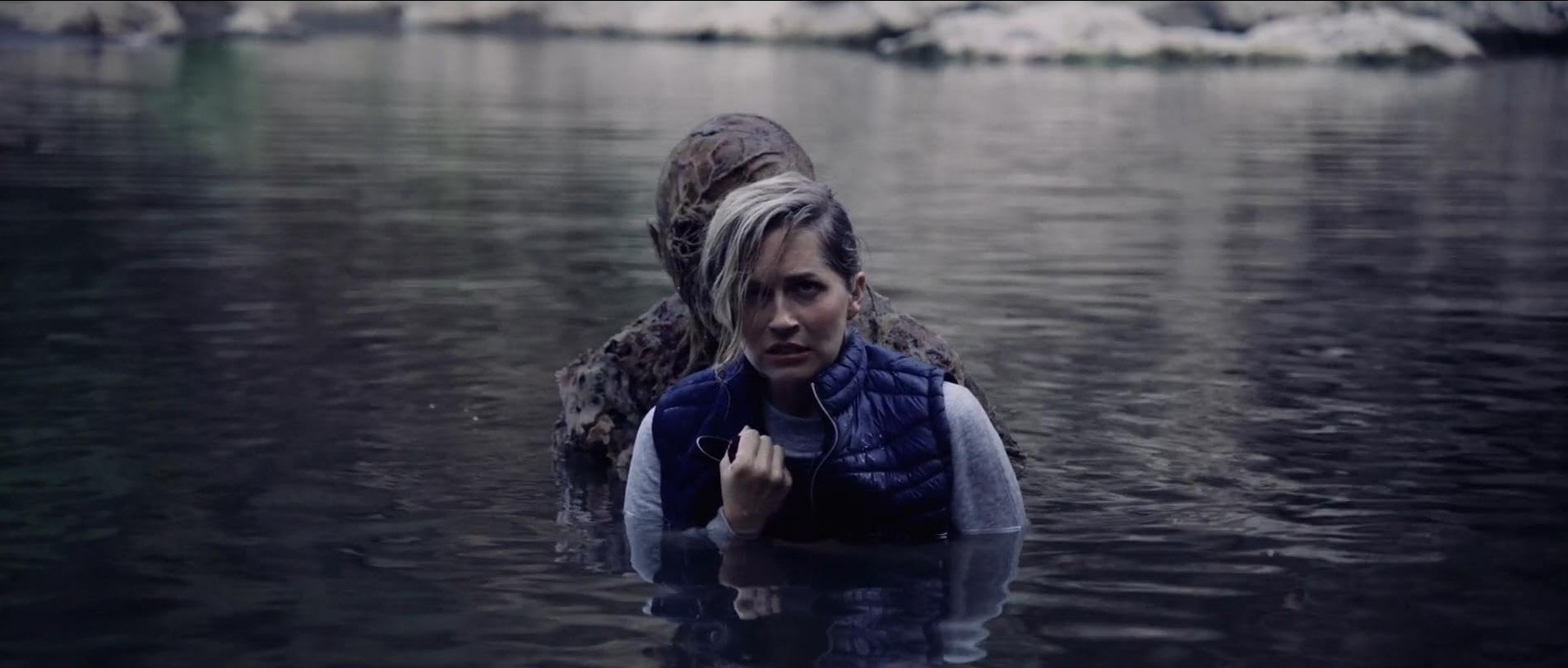
Nix (2022)
Rating: B
Dir: Anthony C. Ferrante
Star: James Zimbardi, Dee Wallace, Niesha Renee Guilbot, Angie Teodora Dick
I was a bit worried going into this, having read interviews in which the director described this using the “e”‐word: elevated. It’s a concern, because I’ve sat through my share of films with the label, where the makers have been so concerned with being elevated, they forget about the horror. The results turn into more of an angst-ridden drama, something of little interest to me. This, however, probably works even if you ignore all the motifs about addiction and loss. Admittedly, it may be more than a bit confusing, with explanations very much limited. However, the strong performances, particularly from Wallace, hold things together. [And can I say: somebody needs to bring together Wallace, Lin Shaye and Lynn Lowry, the three grand dames of modern horror]
It begins with the Coyle family suffering a tragedy on vacation, leading to the disappearance of the father and daughter. Decades later, the trauma still resonates. Mother Donna (Wallace) believes her child will be found. Son Lucas carries guilt, uses drugs to cope, and his own young daughter, Zoey (Guilbot), is suffering as a result. While his brother Jack (Zimbardi) seems well-enough adjusted, the cracks begin to show as the pressure increases, threatening his relationship with his girlfriend, Liz (Dick). All of which could well be that angsty drama. Except there’s a monster lurking – it may be a creature of folklore, or a manifestation of their psyches – as well as the truth about exactly what happened by the lake, all those years ago.
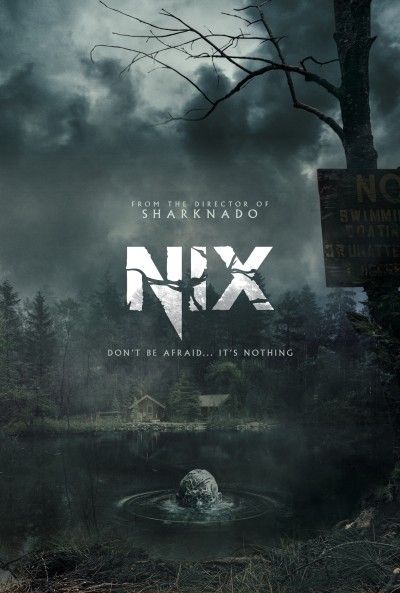 It is the case that the viewer needs to buy into the concept here. If you don’t, this could well seem trite or ridiculous. Personally, this wasn’t much of a problem: the opening sequence, giving us a depiction of the holiday incident, pulled me in from the start. There was a bumpy patch thereafter, as the jump to the present day is a disorienting one. We ended up having to pause the movie for a moment, to sort out who was who. However, once that was squared away, we settled in to watch the Coyle family slowly tearing itself apart, in a relentless combination of recriminations and substance abuse. In particular, Zoey’s mother is “Just Say No” made flesh.
It is the case that the viewer needs to buy into the concept here. If you don’t, this could well seem trite or ridiculous. Personally, this wasn’t much of a problem: the opening sequence, giving us a depiction of the holiday incident, pulled me in from the start. There was a bumpy patch thereafter, as the jump to the present day is a disorienting one. We ended up having to pause the movie for a moment, to sort out who was who. However, once that was squared away, we settled in to watch the Coyle family slowly tearing itself apart, in a relentless combination of recriminations and substance abuse. In particular, Zoey’s mother is “Just Say No” made flesh.
Jack becomes an increasingly unreliable narrator, though there’s enough overlap between his experience and Zoey’s to suggest some objective elements, and that there is a creature in play. Quite what it is, does, or wants is unclear. There’s a brief conversation with a German woman that suggests it is of European origin, though you need to be fine with the specifics remaining vague. What does work well – surprisingly so for horror – are the emotional beats, such as an unexpected reunion between Jack and his father. It quietly snuck up on me, but by the end, I cared about him and his mother, even though the latter has been carrying a terrible burden for a generation. It’s an unexpected outcome, one which doesn’t happen often to a tired cynic like me.
What are you working on now?
Blind Waters airs on Tubi on Friday. I did a horror movie last year, it doesn’t have a release date yet, but it’s called Dante’s Hotel. It’s a bloody horror film, which is cool. That’s all I can really say about it right now. If Nix is the antithesis of what you would expect from a horror movie, this is everything you would expect from a horror movie! It’s probably closer to my first film, Boo, than anything else I’ve done, because it’s just a big, horror, popcorn ride.
Sharknado seemed to trigger a whole slew of outrageous shark films, from Post Apocalyptic Commando Shark to Doll Shark. Do you watch any of them?
There are so many great things that are happening, and so many fun concepts, but after you’ve been through the whole Sharknado wringer, just to sit down and watch another shark movie… There’s been some really good ones, but you get kinda exhausted after you’ve done six of them!
Do you have any favorite shark movies yourself?
I like Jaws. At some point, we usually try to watch the first two Jaws’s and every couple of years we’ll throw on Jaws 3 and Jaws: The Revenge. Even though it’s not a shark movie, I love Piranha. It’s very akin to shark movies, so I add that in there. The Joe Dante movie is a Jaws rip-off, but if there’s anything that’s a precursor to Sharknado, it’s Piranha. Because it’s a movie that’s aware of itself, but is still a movie. It didn’t have the budget of Jaws, but it used its ingenuity in ways that show you what a mad talent Joe Dante was.
I think Open Water is a great shark movie. Actually, a brilliant shark film of the last ten years is The Shallows. I wish I had the budget to do something like it, that movie was just phenomenal, it’s a great shark movie. I’ve been digging into some older sharksploitation movies: Tintorera, Cruel Jaws – I haven’t watched that one yet, but I’ve got a copy of it. It’s the Italian knock-off, and they actually use footage of Jaws in there! Another interesting one, though it’s not a shark, is Orca – it’s a really fascinating Jaws rip-off. There’s a lot of clever things. When we were doing SyFy, they’d have a whole week, and there were some really funny titles, like Ghost Shark and Santa Jaws. Sharks are always going to be around, and shark movies are always going to be around.
Here’s the craziest thing. Open Water, people know about, but they don’t know it well. For a while, when you talked about shark movies, it would always be Jaws and Deep Blue Sea. In the last ten years, if you asked people to name two shark movies, they’d say Jaws and they’d pretty much say Sharknado. There’s been these double-features that I’ve seen at drive-ins, where they show Jaws and Sharknado for one night only. To be linked to Jaws, in its own weird way – we’ve landed. And Sharknado’s still there. We do this silly Barbie poster, and we break the Internet again. We did this silly thing to get attention to the screening, and it’s ten years all over again.
Looking back, what do you take away from the whole Sharknado experience?
I’m proud of the movie. If we’re going to do anything with Sharknado, we should go back and remake it with a bigger budget. Do the 21 Jump Street thing, just go balls-out. But fans found it, they discovered it, they made it successful and it was because of the fans, not because of anything else. There was no marketing for that first movie, it was all grass roots. So I’ve got to thank the fans, because we wouldn’t be here without them. They stayed with us for six years, and they seem to be coming along for the ride on the theatrical.
When you make a movie, you put everything you can into it, no matter what it is. Because if hits, it’s permanent.
When you make a movie, you put everything you can into it, no matter what it is. Because if hits, it’s permanent. I see all the shortcomings of that movie, but I embrace the limitations, for what they are, and it turned into a joyful thing for a lot of people. There’s a lot of people that hate-watch it, but there’s a lot of people that genuinely love the movie, and it means something to them. Because it’s a movie that feels like it was written by an eight-year-old – in a good way. It has that innocence to it. “Then he goes and gets swallowed by the shark and then he chainsaws his way out of the shark and then he pulls Nova out of the shark and then the whole world’s destroyed in the end.” It has that sensibility.
We’ve got to the point where you can do anything at the movies, with these big budgets. And here’s a movie which didn’t, that hit the zeitgeist, and I think that’s part of its charm. There’s an “energy of desperation” that these movies have, and I think that’s why people responded. Ten years later, what have we done? We’re still in a world where Sharknado exists, and people still love the ridiculousness. I hope we’re around for another ten years. To still be talking about it ten years later, and still be spoken of in the same breath as Jaws – again I want to stress, Jaws is a brilliant movie and we’re far from that. But when you’re a kid, you hope you’re going to make something that’s going to last. Sharknado will be the thing that lasts. The fact that I can still have a career and make movies, it’s the gift that keeps on giving from that franchise.
